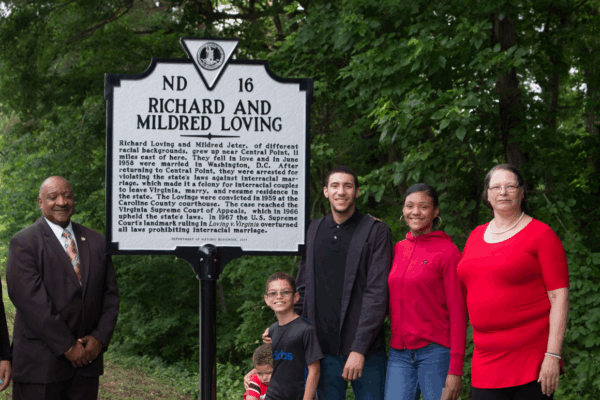By Steve Levinson, president of the Board of Directors of the ACLU of Virginia
As most of you know, I am the President of the Board of Directors of the Virginia Affiliate of the American Civil Liberties Union (ACLU), and I have served in various capacities on the Board since the 1990s. Today, June 12, 2019, is the 52nd anniversary of one of the most important cases in ACLU (and the nation’s) history: Loving v. Virginia, 388 U.S.1 (1967). Richard Loving died in a car accident in 1975. Mildred Loving passed away in May 2008. Below is a little history from several previously-issued national and Virginia ACLU press releases (edited for brevity).
Richard was white and Mildred was black. They wed legally out of state in 1958, but violated Virginia’s anti-miscegenation statute when they moved back to Caroline County, where they had first met. One evening at 3:00 AM, after an anonymous tip, the police entered their home, went to their bedroom as they slept, and arrested them for “cohabitating as man and wife, against the peace and dignity of the Commonwealth.” They spent some time in the county jail.
The Caroline County judge, who in 1959 found them guilty of violating the Virginia Racial Integrity Act, wrote: “Almighty God created the races white, black, yellow, malay and red, and he placed them on separate continents. The fact that he separated the races shows that he did not intend for the races to mix.”
Richard and Mildred received a one-year prison sentence, which would be suspended if they left Virginia. They moved to Washington, D.C., sneaking home to see family and friends. Mildred wrote a letter to U.S. Attorney General Robert F. Kennedy, who referred her to the ACLU.
For those of us who grew up or worked in the segregated South in the 1950s and 1960s, this kind of bigoted reasoning from a rural county judge was not terribly shocking. But there will never be an excuse for the disgraceful ruling from the Virginia Supreme Court that followed. In 1965, Virginia’s finest legal minds, many educated in Virginia’s best schools, upheld the ban on interracial marriage, citing an earlier case in which they said the state was obligated “to preserve the racial integrity of its citizens” and to prevent “the corruption of blood,” “a mongrel breed of citizens,” and “the obliteration of racial pride.”
Fortunately, the U.S. Supreme Court -- only one hundred miles up the road from Richmond, but worlds apart from the Southern ethos that dominated the Virginia judicial system -- saw it differently. The high court had given us Brown v. Board of Education a decade earlier and was poised to strike again in the name of racial equality. Loving v. Virginia was in the right place at the right time, and in 1967 the Supreme Court ruled that Virginia’s anti-miscegenation law -- and similar laws in the 18 other Southern states -- was unconstitutional: "[T]he freedom to marry, or not marry, a person of another race resides with the individual, and cannot be infringed by the State."
When the U.S. Supreme Court ruling declared Virginia’s law to be unconstitutional, sixteen other state laws prohibiting interracial marriage fell as well. Fifteen of the sixteen states formed a Southern block from Texas to Missouri to Virginia to Florida.
But it might never have happened, at least not here anyway, if U.S. Attorney General Bobby Kennedy had not referred Mildred Loving to the ACLU after she asked for help. The ACLU contacted two very young Alexandria attorneys, Phil Hirschkop (one of the founders of the Virginia ACLU and my dear friend for over 30 years) and Bernie Cohen. Working as volunteers for the ACLU, and representing the Lovings without charge, they took the case all the way to its inevitable conclusion.
Important things happen in different ways in this country. There are full blown movements that gather momentum and force change through the making of new laws. The women’s suffrage movement that led to the Nineteenth Amendment and the civil rights movement that brought us the Civil Rights Act of 1964 come to mind. Then there are carefully planned lawsuits, years in the making like the aforementioned Brown v. Board of Education, which led to the desegregation of public schools. But sometimes it is just individuals who will not take no for an answer who propel us forward. Mildred and Richard Loving loved each other, and wanted to be married and to live in Virginia. She contacted the Attorney General of the United States, who contacted the ACLU, which then contacted a couple of attorneys in Virginia…and history was made.
Happy Loving Day!

